|
Pain is inevitable. Suffering is optional.
This teaching from Buddha changed my life and put me on a healing path after my Dad’s suicide. And, as I was thinking about what to write on this the 18th anniversary of his death, April 27, the day before his 62nd birthday, April 28 – the celebration of his life, I was blindsided by a sudden and devastating death of a young coworker and friend. (That’s his picture of totality above.) What the fuck do you do with this? Why the fuck? How the fuck? So young. What happened? He didn’t seem that sick. It can’t be. It is. It just is. Pain. I am suffering for him, his family, his wife, my other coworkers, myself. And then, there’s this word – totality – that has been agitating my brain ever since the solar eclipse a few weeks back when we were all consumed with the “path of totality” – millions packing up their families and their cars with totality as their destination. What a word! Totality! I couldn’t decide if I feared it, or I was seeking it. Whether it is closed and final and finite or the key to transcendence and the eternal. Totality. What is the lesson to be learned beyond a neat, stellar phenomenon for a couple of minutes? Surely, it’s more than cosmic entertainment, cheap cardboard sunglasses, and a media bonanza! It wasn’t coming to me though. But, that word – totality - wouldn’t leave me alone. And then, Andrew died. His photos of totality still in my texts from him. He had flown home to experience the path of totality with his family. Is death totality? I don’t think so. Or, at least, that’s not what has been bothering me with that word for all these weeks. What is totality in life? In the living? And, while I was running yesterday trying to burn off the overwhelming suffering energy that has had me wrecked since I heard the news of my friend’s death, it suddenly became clear to me again, like it did when Dad died, and I read those words the first time from Buddha. Totality is just the sun and the moon together. Both light and shadow. Source and reflection. Love and loss. Joy and sorrow. Fullness and loneliness. Presence and absence. Life and death. Totality is not a celestial moment that happens once in a generation. It is existence. All of it. In totality. And, in human existence, pain is inevitable. Suffering is optional. Thank you for the light. It will always be part of my darkness.
1 Comment
 I’m doing the dishes. I like to listen to music while I do the dishes. Tonight, I needed some Pearl Jam. Alexa hit me with “Yellow Ledbetter” out of the gate. So, I obviously asked her to turn it up! The luxury of hands-free Alexa when your hands are covered with dish suds! I am almost immediately sing-mumbling at the top of my lungs about a porch and a wave and a boxer or a bag. Who knows what the hell that song says, and who really cares! Just sing! And, do it loud! Like I’ve been doing it for 30 years! My sweet and lovingly spiteful younger daughter in defiance of the volume of both my music and my voice – which could never be mistaken for music – decides she suddenly wants to practice her piano and asks if I will turn the music down. I politely decline. I return to my vociferous sing-mumbling: “Ohhhh….ohhhh….yeah…yeah…can you see them…” She turns and heads to the piano. I turn it up more. Still, I start to hear her piano notes through the grungy wash of Pearl Jam at its most melodic and confusing and wonderful. I can tell she’s playing as loud as she can, pushing my grandmother’s ivory piano keys to their limit. But, she will be heard. She’s playing Taylor Swift. “All Too Well.” Taylor will be heard. Pearl Jam or no Pearl Jam. Oh shit. Alexa follows with “Alive”. I am a teenager. And now, I actually know all the words and all the badass air-guitar riffs. But, I’m down to my last dirty bowl. My time and excuse for extremely loud Pearl Jam on a Thursday night, a school night, are running out like the sudsy water down the drain. Taylor via my daughter via my grandmother’s piano keeps audibly peeking in as I reach 1990’s musical euphoria. “Oh, I, oh, I’m still alive.” I reluctantly stop Alexa at the end of “Alive.” I didn’t want to stop. I could have kept doing dishes and jamming all night. Just as Pearl Jam soothed my angsty, teenage soul, so can they soothe my wrinkly, dishpan hands. But, alas. The dishes were done. Taylor takes over. But, just for a few more bars. With the good-spirited spite of my singing and Pearl Jam diminished, my daughter suddenly decided she had practiced enough. Little shit. I love it. I love her. So grunge. But, in the end, I suppose Taylor wins again. So be it. As Eddie Vedder mumbled: “I don’t know whether I’m the boxer or the bag.” It doesn’t matter. Postscript: I decided to look up the lyrics to “Yellow Ledbetter”. It doesn’t make any more sense than the glorious mumbles I hear clear as day in the music. But, for what it’s worth: Yellow Ledbetter Unsealed on a porch a letter sat Then you said I wanna leave it again Once I saw her on a beach of weathered sand And on the sand I wanna leave it again, yeah On a weekend wanna wish it all away And they called and I said that I want what I said And then I call out again And the reason oughtta leave her calm, I know I said I don't know whether I'm the boxer or the bag Oh yeah, can you see them Out on the porch Yeah but they don't wave I see them 'Round the front way, yeah And I know and I know I don't want to stay Make me cry I see I don't know, there's something else I wanna drum it all away Oh, I said I don't, I don't know whether I'm the boxer or the bag Oh yeah, can you see them Out on the porch Yeah but they don't wave I see them 'Round the front way, yeah And I know and I know I don't want to stay I don't wanna stay I don't wanna stay I don't wanna stay, oh no Yeah Oh, oh Oh, oh Images: https://lifeonacocktailnapkin.com/eddie-vedder-in-the-house/ https://www.pinterest.com/pin/taylor-swift-live-performance-in-st-louis--785174516257828659/ But, don’t tell anybody, or it won’t come true.
I was recently at my 90-year-old aunt’s belated birthday party and as they brought out the cake and candles, my cousin reminded her: don’t forget to make a wish! My aunt is 90. She has dementia. She lost her husband a year ago. She can’t walk freely. She can’t manage all body functions. She sits mostly. And, laughs. Some days sharp as a tack. Others, not so much. And, somehow she is still the same old, crazy, wonderful aunt we have all always been crazy about. What did she wish for? This is the first time I’ve ever really wondered much about someone else’s birthday wish - and then almost immediately feared my wondering. What do you wish for at this stage of life? At this stage of health? At this stage of loneliness? Only the day before, I had my own birthday, so my wish was still fresh in my mind as it’s the same wish for every birthday, coin in a fountain, blown dandelion, or clock striking 11:11. I wish for my girls to be happy in their lives. That’s it. Whatever that means. That’s honestly all I wish for. I’ll just have to trust that my wish can still come true despite sharing it here. And, this week, turning 12, my daughter will be prompted to make her own birthday wish. And, like a thousand others before, I won’t really wonder or care too much about what’s in her heart and her mind and in her wish. She’s a kid. Her birthday wish is not for me. But, there was something about my aunt. Something I’m still not settled with, or I wouldn’t be sitting here writing. What do you wish for when life is in its final chapters? Do you wish to see your spouse again, to be reconnected with the love of your life? Do you wish to see your parents? Do you wish you were healthy enough to get around on your own again? Do you wish you could still drive? Do you wish you could still live alone? In the home you built for and with your family? Do you wish you could talk to the friends and family you’ve lost? Do you wish for more years, more life? Or, are all of those wishes really out of the realm? Unreasonable wishes? Lost causes. So, you wish for something that might actually be possible? Do you wish to be done with this life in hopes of moving on to the next? I think I’m troubled by the question because I fear that if I learned my aunt’s answer, somehow it would provide some prescient insight about life that I may not want to know. It’s like being able to predict the future or read someone’s mind. When you’re a kid, maybe it sounds fun. As an adult, it sounds horrifying. I don't fear death, but perhaps I do fear wishing for it. There’s simply no doubt that I would do anything I could to support and help my aunt realize her wish. She’s earned whatever it is. And yet, what can I do? Almost nothing. And, this may be exactly why she shouldn’t share her wish and exactly why I don’t want or need to know it. I’ll just wonder for myself – if I am lucky enough to live to 90 years old and to have lived the life and loved and lost the people that she has, if my mind is fading, if my body has faded, and yet I still love, and yet I still laugh, and yet I’m still alive, and yet…what will I wish for? Please nobody tell me. I’m currently sitting in the airport waiting on a delayed flight for a trip I could have never imagined taking when I was a child. I mean, it makes sense, but for most of us we don’t let our minds go certain places until we have to. For this trip, I had to.
I was flying with my two girls and wife along with a dozen or so other family members coming from different directions to see my Uncle Roy who is dying of bone cancer. And, while he is 90, he’s a man I’ve known my whole life to be as full of life and intellect and spirit as anyone you could find. A scientist, an educator, a father, grandfather, and great grandfather. I hadn’t seen him in years and wasn’t really sure what to expect. He’s been suffering a long time. But, when I sat down next to him, I found it was only his body failing. The rest was intact. “I picked up your book again, Creating Matters. I read it when you first wrote it. I can’t help but believe there is a connection to God there.” He continued talking about Biblical creation and we made the connection to where and how I had found myself and my connection to a higher power through the process of creating art, how while I do not go to church, my family and I go to the mountains – our way of touching transcendence. I immediately had a feeling this was how he used to talk with my Dad. I sensed in my gut he may have been hoping for this conversation with me. But, I wasn’t sure what his stamina was at this point, so I just let it all sink in as things fell quiet between us – the splashes and laughs of my kids playing in the pool resurging to their rightful place in the moment. “I used to love to talk with your Dad.” He stated quietly as he broke back into the moment without looking at me. He continued matter-of-factly and affirmatively. “I know I’m not long for this life now. I loved your Dad. I know I’m going to get to talk to him again soon.” He gazed forward almost longingly. These words would be powerful regardless. But, Uncle Roy is a steadfast Christian. Something my Dad was not, and something I can only imagine they spent countless hours discussing and debating – a scientist and an attorney, a Christian and a victim of the Church’s guilt and judgment. My Dad died by suicide 17 years ago. I know this part of my family loved my Dad for who he was in life and death. But, I never asked what any of them thought religiously about his suicide. I honestly never considered it. I didn’t really care. So, it was surprising how much Uncle Roy’s words about talking with my Dad again hit me. They landed as more than words. They were a pronouncement, a proclamation. They were a beautiful and hopeful vision of two very different lives and spirits rejoining in an afterlife to continue their conversation – probably, in part, about whether or not there’s an afterlife. The weekend was a joy and a celebration with cousins I’d grown up with but rarely see, with their children, and with the child of one of their children – the great grandchild, the great nephew, four generations together. A two-year-old for all of us to love and dote on as we wittingly or unwittingly sought to hold on to life and light despite the cause for our gathering. It’s only been a matter of months since we also said farewell to another dearly loved uncle, Uncle Ty, of the same generation, who added an accountant’s perspective to the dialogues of the attorney and the scientist. I’d visited Uncle Ty just months before. And, it was the last time. This is 47 years old, I guess. This is the generational shift. This is the cost of a lifetime of joy and love and connection (and the invariable dose of dysfunction) with a big family. The fortune. The pain I must reframe and reposition in relation to the size of the gift. I’d already broken down in tears before it was time to go to the airport and had mostly regrouped with the love and hugs and kindness of my daughter. She gave me strength. She gave me grounding. She made me feel better as I deal with losing my past. She and her sister are my ultimate present and future. But, then there’s still that moment. It’s finally time to go to the airport. Which means you line up with other family members at the foot of the wheelchair to give a hug that everyone knows is the last time. The moment starts to consume me. Its potency is magnified by the mutual recognition. And as I leaned over to hug Uncle Roy, I wasn’t sure how long I could contain myself. I was just trying to hold on long enough to get my sunglasses back on and get out the door where I would feel free to lose it again. “I love you.” I whispered haltingly to my uncle. “BUTT PASTE!!!” A tiny but loud voice came shattering through the moment. The great grandchild and 2-year-old had been enjoying a new audience during the weekend. He’d been saying “butt paste” for two days and getting a laugh from all ages and directions. But, this one he brought with conviction, louder than he’d said it all weekend, an exultation for all to witness! A call to the altar of life. It was the youngest spirit in the room reminding us – “Hey! I’m here. You’re still here! Butt paste!” And, it continues. A life that is so much more than us and so much bigger than we can conceive. A spirit that connects us, came before us, and lives after us. An energy that can lift us and break us and lift us again. A life so wondrous that it begs for an afterlife, but still grounds and humbles us with butt paste. I hope Uncle Roy tells my Dad about butt paste. He’ll think it’s hilarious. 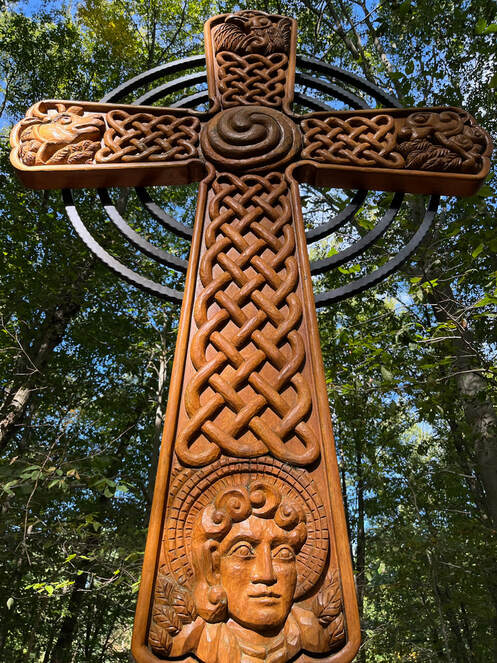 When an artist dies, the path we travel through the woods toward remembrance and celebration softly, fully thuds beneath our feet, the peaty, pungent soil reminding us it has been formed over millennia through life and death; it is solid; we are solid. But, we should step forward with intention. When an artist dies, the wind rustles the treetops soaring above us, flickering the earliest yellows of Fall against an azure blue sky, whispering a message without words that she is still with us. The wind is now ours. We must make the meaning; we must deliver the message. When an artist dies, the sun darts through the trees casting light on her work so we can see her hands in it; we see her labor; we see her mind; we see her heart. And, there it all is, right there before us. The artist is among us. She is not gone. When an artist dies, the air cools in contrast to the sunny warmth of the light, enlivening and spiriting our bodies from head to toe, reminding us we are alive. We are still here. We have love to share, miles to travel, things to create, life to live. When an artist dies, the doctrines and diocese and dogmas of the world’s religions come home to find their essence in the woods, among love and loss and celebration, with friends and family, under the gaze of a god you understand and who understands you. When an artist dies, her work lives. In the untethering from the life of the maker, her art takes a life of its own, creating stories and memories and inspiration for all who encounter it - organically, in the universal life and narrative we share as people, perhaps along another’s peaty path toward remembrance and celebration. Through her art, the artist reminds us that it is indeed what we do - not what we say - and what we create – not what we consume - that give form and meaning to our lives, that connect us to the regenerative spirit of the world, that give us all access to the eternal. In loving and creative remembrance of (Aunt) Peg Van Brunt, whose life was art and whose art lives on. May 27, 1941 – August 2, 2022 Last night, I pulled my kids back out of bed so they could come outside and see the fireflies that were practically swarming in the fields around our place. I wanted them to see the wonder, but what I saw felt far more profound.
After they finally went to bed, my mind swirled with what I’d just witnessed as they bounded and ran and jumped and laughed and frolicked and screeched through the near darkness. The wisdom of my children and the fireflies they chase:
Image: https://enchantedmountains.com/events/2019/06/natures-lightshow-synchronous-firefly-allegany-state-park-8647 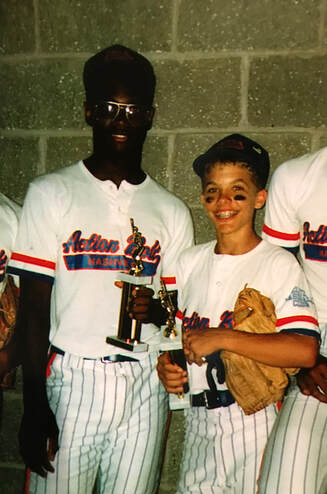 It’s April. The month of my Father’s birthday. The day after his death. Suicide. It’s kind of a shitty month. Thank god for Spring - and friends. I write something every year around this time out of a commitment to talking openly about suicide, Depression, and sexual abuse – no fear, no shame, no judgment. But, this year, I’m feeling reflective in ways I am not ready to express despite the 16 years that have passed. I am good, but I have thoughts that haven’t yet coalesced as to my own Fatherhood unfolding and the conversations I’ll be having before long with my daughters. So, here I am instead writing something that has been on my mind for all of those 16 years since Dad died. Long overdue. Finally ready to be written. It’s a story about a friend, a term redefined in this experience. Not an action story. Perhaps an inaction story. A story about something deeper. Silent. Eternal. Strengthening. When my Dad committed suicide, in celebration of his life, we welcomed hundreds of people into our house. They were literally lined around the block. People who loved my Dad. Loved my family. People who were seeking solace themselves. People who didn’t know what else to do but show up. And, for hours, the line continued. Hugs. Tears. Confusion. Sympathy. Incoherent thoughts and reflections. I ebbed and flowed as I greeted people. Strength coming as I consoled the old classmate or previous neighbor who never knew Dad suffered from Depression. The long hugs from those who whispered quietly in my ear that they too had been sexually abused as a child or suffered from Depression. The moments of despair when I collapsed in someone’s arms, not knowing the specific trigger, but unable to take any more in that moment. This was a community of people, of love, of trying to come to grips with suicide, with loss, with the contradiction of a powerful and confidant and formidable external persona and the person who couldn’t find himself worthy to live. I don’t remember a lot of details of that day, or really that time for that matter - months - but I do remember this general scene as if I had watched it from the ceiling. And, I do remember my friend, vividly, the friend I met when I was 10, playing All-Star baseball at Shelby Park (the picture is a few years later, I still look 10 and he looks 17), the friend with whom my connection had been immediate, grown deep and personal over time (20 years then, 36 now), intuitive, and yet at times distant as our lives followed divergent paths, a friend who stood there in the front room of our house, hands clasped in front of him, button-down shirt, for untold hours, right there beside me. He stood there seeming only to move when he knew I had the strength to be still, and being still when he knew I might collapse under the weight of the moment. An exoskeleton. For hours, I never saw him leave. I never saw him eat. I never saw him go to the bathroom. He didn’t muster much conversation with anyone. He just stood there, steps from me, never leaving his post. Still. Upright. Guarding me. Protecting me. Sustaining me. I can see him today as I could see him 16 years ago. I know he was a wreck too. I know how much he loved my Dad. And, yet. I have no idea what I said to him that day. I have no idea if I thanked him for being one of the first to arrive and last to leave. He couldn’t know what his presence looked like, felt like, to me as I found myself looking to him - as he only looked forward - to find my strength, to find my backbone, to know that something was solid in this moment of loss and world-shifting fluidity. For 16 years, I have held this image of Andre standing there, by me, with me, for me, as me, when I just didn’t know how I might do it myself. Not doing anything. Not needing anything. Not knowing that you were doing anything other than what you should be doing. This is the gift. This is the offering of healing from a friend when healing was yet to begin. I have never had the courage to write this. The gratitude is easy. The writing is difficult. But, the time is finally here to say thank you. I don’t know what else to say. It feels insufficient, out-of-date, and yet as deep and profound as I can offer from one human being to another. And, 16 years later, unsure of my words for today, April bringing a new season, a new year without my Dad, it is in long-overdue gratitude that I find my voice and continued healing. Thank you, Uncle Dre. I’m sorry it has taken so long. 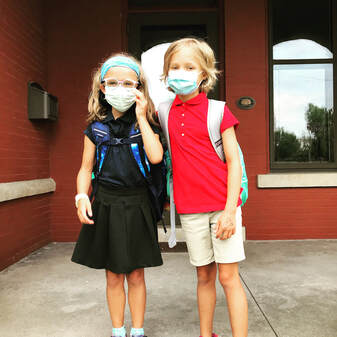 We are three weeks into the fourth grade and my Daughter is already on her second school-based activism/organizing campaign. It’s hard to know what is nature and what is nurture, but neither of these campaigns has been drummed up at home or from conversations with my wife or me. My daughter has just come home and said: this is what I am doing. The current campaign has just begun: a drive to organize donations from other students in her school to help the flood victims in West Tennessee. On her own, she’s gotten support from the Principal. She’s garnered a teacher sponsor. She and her sister were making signs last night to put up around school. For a couple of days in, she’s got a pretty solid plan and process in place. We will see how it all unfolds. But, it was her first campaign that was so important and has the most to learn from. So, my daughter came home one day saying that she and her friends had started a petition that would ease the restrictions on standard school attire for fourth graders. No doubt, a year of being schooled at home makes standard school attire seem that much more annoying. Not to mention, as a fourth grader, she is starting to want to express herself through her fashion and accessorizing in new and different ways that are largely outside of standard school attire. She decided she could - and should - do something about it. And, despite ultimately canceling the effort – or perhaps because of that – she illuminated some powerful lessons about organizing and life in general: LESSON 1: Passion ignites action. Clearly, my daughter and her co-conspirator friend had talked and were feeling strongly about their rights as fourth graders to wear what they want to, and even to be treated a little differently. They felt that as the oldest kids in school and those doing the “hardest” work that some reprieve from standard school attire would just help relieve all of that bottled up stress. While loaded with some pre-middle school drama at its source, I have to say she presented her argument logically and thoughtfully with a level of passion that I certainly wanted to encourage. LESSON 2: You can’t go it alone. Not to mention, by the time I even knew anything, she and her friend had already created a petition and enlisted others to help them gather signatures – which was pretty badass. They had even talked with a couple of teachers who, to their credit, encouraged the process the girls were undertaking without dismissing them, discouraging them, or otherwise derailing their passion. But, my Daughter and her friend knew they ultimately had to get the Principal’s buy-in. LESSON 3: Start with a plan (but be willing to throw it out). And, to do this, they were going to gather signatures from all of the 4th graders and deliver this petition to their Principal. They had decided who was going to cover which classes and which periods when they could gather signatures without disrupting their coursework. When they had all of the signatures, they would deliver the petition. LESSON: Stay open to feedback. So, it was at this point that I finally heard about this campaign. At dinner, my Daughter was so excited and fired up that she talked and talked and talked until I finally had to break in and ask a few questions. I told her I appreciated and supported her action, and was proud of the steps she had already taken, I could tell she had really thought about how to do this, but that I had some questions for her to consider:
LESSON: Back your passion with reason. Do your research. To her credit and her friend’s, regarding the first question, they decided they couldn’t reasonably answer why 4th graders should be treated differently and they quickly opened there demands for school attire leniency to be more inclusive of other grades. They were no longer seeking change that privileged one group over the other. This was, I thought, a pretty great breakthrough and recognition on their part. But, more importantly to the second question, a couple of days later, they actually did go to their Principal to ask why standard school attire was instituted in the first place. And, what they learned is that standard school attire is an attempt to ensure no one feels excluded if they can’t afford new, or stylish, or even clean clothes to come to school every day. LESSON: Recognize your privilege - and reframe. As she processed this learning, she explored other options. Maybe you could wear pajamas. Maybe a school t-shirt. Maybe if you didn’t have clothes to wear you could just stay with standard school attire. There were several more, but she quickly realized that all of them ended up with the same challenge: kids from lower income families always ran the risk of being spotlighted inadvertently. As we discussed this at dinner and she ran through the possible variations and adaptations of her campaign, she finally just sort of got quiet. She was obviously reflecting – also badass. LESSON: Don’t be too proud to change. I didn’t hear anything else about the petition for several days. So, this morning, I asked what they had decided to do. She told me she and her friends had decided not to carry through with their campaign. They didn’t want to do anything that made other students feel uncomfortable or different because they may have less money. I am writing this having just dropped my girls off for school, loaded with signs and plans and preparing speeches to gather donations to help the flood victims. Campaign #2 is now under way, and I am again proud of her efforts (and her inclusion of her little sister – both kind and strategic). I am sure there will be more to come, but for now, I couldn't be more proud of the campaign that wasn’t. * And, for the record, the masks don't bother them at all! Update: Here’s a shot of the donations for pets (with mine hoping for a ride) collected by her school and delivered to Waverly. My Dad suffered deeply from Depression. He was sexually abused by a neighbor as a young child. Surrounded by religious judgment. Guilt. Conditional love. He wrestled with these demons his whole life. Ultimately, he committed suicide a day before his 62nd birthday. 15 years ago this month.
The last words we received from him: “I love you all, but I hate myself.” Thanks to a neighbor who recently shared this video with me - found on a VHS tape in an attic - I just heard Dad’s voice for the first time in 15 years. Oh, his way with words. His tone. Silky flow. Weather worn. Southern drawl. It could sooth just as it could cut. Eloquence colored by the language of a sailor. I remember as a small child his reading me Cinderella and the sound and vibration and depth of the clock striking midnight as he slowed for dramatic effect - BONG! BONG! BONG! - my head resting against his chest. Feeling the vibration. His life was brutal within - those vibrations - but most never knew it. He was charming and gregarious and made you feel like you mattered - no matter who you were or where you’d come from. He knew others’ darkness in ways no one else could understand - ways others didn’t even understand about themselves - and loved them for it. He also fought for those people, his people - in schools, in the neighborhood, anywhere he found them. He took on challenges - in court as an attorney and in life as a Dad and Husband and as a community activist with my Mom in rebuilding our neighborhood - that just begged him to fail. I actually sometimes think he wanted to fail. It would have proven him right about himself. Fulfill the darkness. But, he didn’t fail. Yes, he had failings and weaknesses and flaws like any of us. But, somehow, he transformed his deepest demons into a life of beauty. Today, amid the noise and all of the activity of our daily - often transactional - lives, we look but we never see. We do but we rarely just be. I am as guilty as any. There is no nuance. There is no suggestion. We are missing the thrilling contradiction of bold humility, the creativity of belief, and the acceptance and ownership of the battles between our demons and our best selves. We are missing beauty. But, we cannot have beauty without honesty. We cannot have beauty without vulnerability. We cannot have beauty without tragedy. This is the truth of the human condition. This is the truth of my Dad’s life in hyper-focus. This is the truth of my memories. Our lives. This month. A suicide and a birthday. The contradiction. The tragedy. The beauty. Dad’s words in this video about our violent, crumbling, and forgotten neighborhood - an undeniable metaphor of his inner life - ring profound today as I reflect on it all: “You’d have to be blind not to see there was some beauty there.” 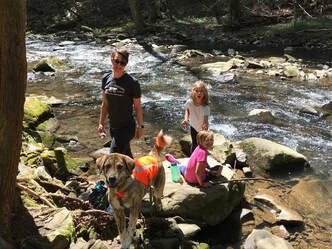 Last weekend, I went hiking with my wife and daughters. We headed to a familiar trail knowing from previous hikes that the bridge was out where we needed to cross the river. But, we also knew that a couple of trees had fallen previously and created a very workable bridge that we’d successfully navigated before. But, as we approached, we realized those two big trees were no longer lying across the river. They were gone. It’s early Spring now and we weren’t planning on swimming and didn’t have any water shoes and the water was high and quite cold - but it was the beginning of the hike and we had to get across. Given that our trees were gone, the next obvious thing to look for were stepping stones - some pattern for us to get across without getting wet. No luck. So, then we walked up and down the bank a bit looking for options. And, low and behold, there was actually another fallen tree reaching all the way from bank to bank. The problem was that there was no way any of us had the balance to climb across it. That wouldn’t work either. Ultimately, we all shed our shoes and teamwork-ed it across the river - my kids were total troopers as we slipped and slid and stepped on rocks of all shapes and sharpness while our feet slowly transitioned from painfully cold to numb. It was not easy or particularly pleasant, my daughter hurt her ankle for starters as her foot slid deep between two rocks, but we crossed and continued on a wonderful hike (albeit with a bit of a limp) that included a picnic at a waterfall. On the way back, we approached that same crossing and that same skinny tree traversing the river - and a totally different idea came to mind. What if we didn’t try to walk on it but rather used it as a balance rail? After all, the rocks had been even more slick and more treacherous than we realized the first time. We’d still go barefoot but we’d at least have something to hold onto. As we mulled this option, we also noticed that the river bed was markedly smoother - pretty much one solid rock - at this small section beneath this tree. We shed our shoes and were across in no time - no slips, no falls, no ankle injuries. This all left me curious as to why we hadn’t seen this tree and this section of the river as the solution when we first faced the problem that day of crossing the river without a bridge. We had looked right at it! Here’s what I’ve come up with: 1. We initially doubled down on our problem-centric thinking. We needed to cross the river and the bridge was out, and now our familiar fallen-tree crossing was out too! We unconsciously processed this as two problems (1. Need to cross and 2. No trees) when really it was still the original problem and the absence of a previous solution. And, we unfortunately started solving for the absence of a previous solution: we needed a tree to walk across because that’s how we’d solved this before, but the one flimsy tree we saw just wasn’t going to cut it. 2. We jumped too quickly to a new solution without creatively adapting the resources we already had and knew. The tree was key to efficiently solving our problem all along - at least on this day - but when we couldn’t find one to walk across, we threw it out as part of the solution. We jumped quickly to the stepping stones strategy and then to the straight-up wading strategy without thinking creatively about how the tree could still be used in a different way to help us across the river. 3. We didn’t fully evaluate all of the variables and possibilities available with a new strategy. We knew the water was cold and we weren’t exactly excited about getting wet at the very beginning of the hike. But, once we believed that was the only option, we just made it happen. We looked at the depth of the water. We looked at the speed of the water. We knew about the cold of the water. We knew the rocks were slippery (not that slipper though!). We knew they could be sharp. But, we didn’t consider the alternative possibility of finding a smooth, solid rock floor that was just 30 feet from us - beneath that tree. Problems and solutions both build inertia, and sometimes this is critical for efficient and quick decision-making. But, sometimes this inertia sends us on the wrong path or on a more difficult path to the same spot or perhaps even derails us altogether (my daughter’s ankle could have been a lot worse) all because of the initial ease of not thinking much or the comforting familiarity with a known version of the problem and/or solution. So, if we can start recognizing and feeling inertia in our work and in our lives and committing to pausing just for a moment to take in the situation anew, to make sure we’ve thought of all of the variables, seen them fresh for today, and built our best options from there - rather than yesterday - we will find small moments each day that can transform how we create our way through life. |
Categories
All
Archives
April 2024
|
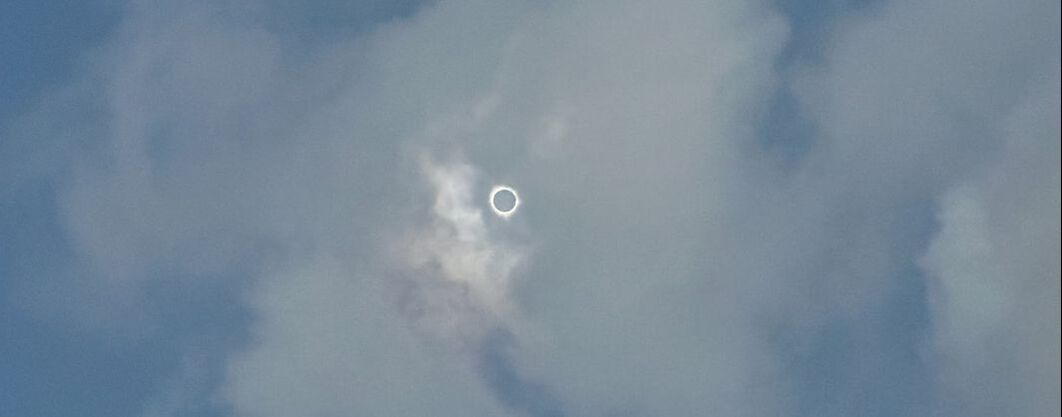
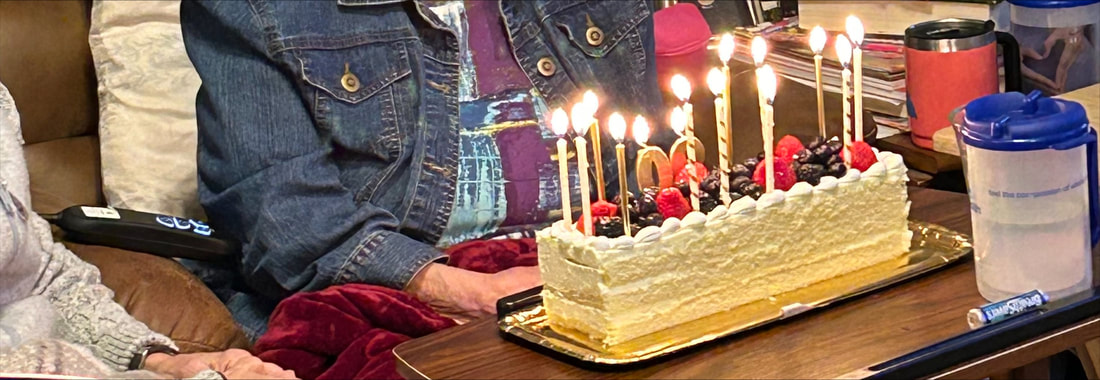
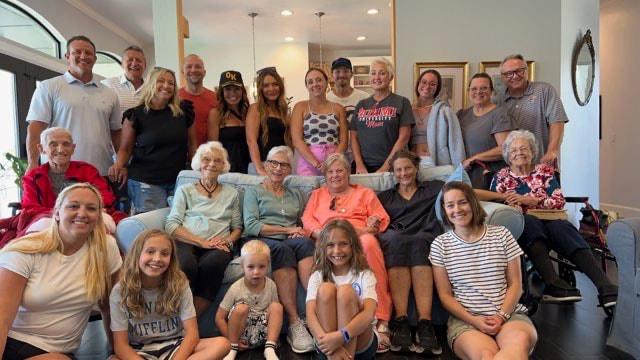

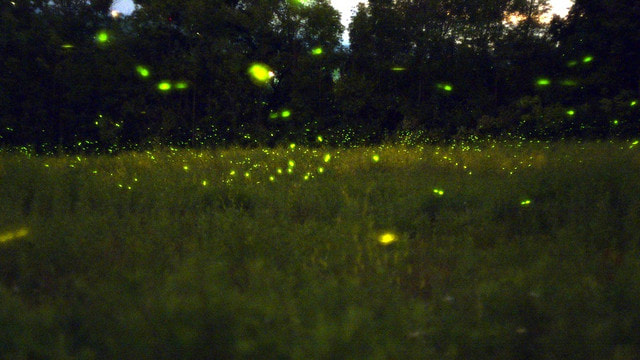
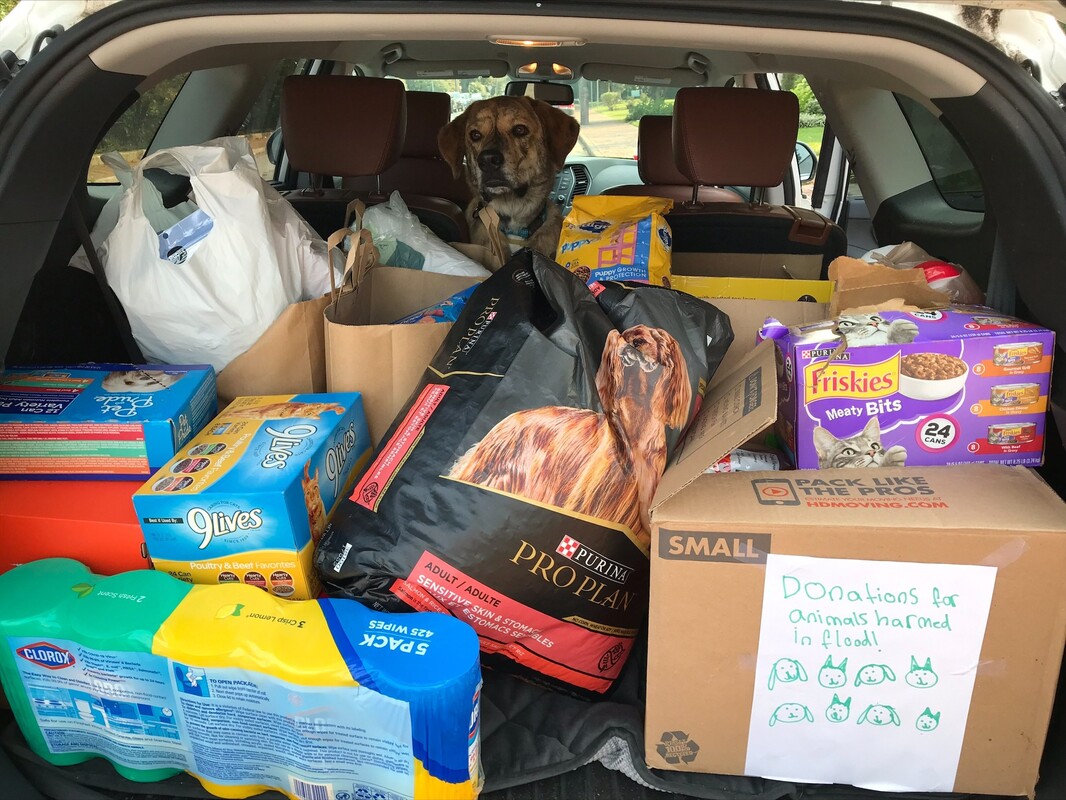
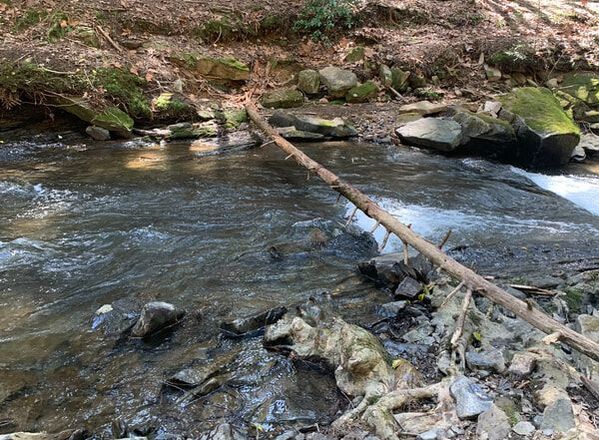
 RSS Feed
RSS Feed